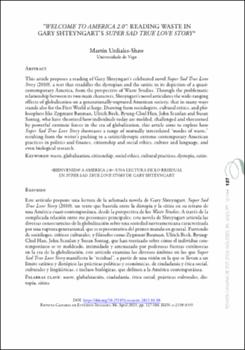“Welcome to America 2.0”: Reading Waste in Gary Shteyngart’s Super Sad True Love Story
Autor
Urdiales-Shaw, MartínFecha
2023Resumen
This article proposes a reading of Gary Shteyngart’s celebrated novel Super Sad True Love
Story (2010), a text that straddles the dystopian and the satiric in its depiction of a quasi-
contemporary America, from the perspective of Waste Studies. Through the problematic
relationship between its two main characters, Shteyngart’s novel articulates the wide-ranging
effects of globalization on a generationally-ruptured American society, that in many ways
stands also for the First World at large. Drawing from sociologists, cultural critics, and phi-
losophers like Zygmunt Bauman, Ulrich Beck, Byung-Chul Han, John Scanlan and Susan
Sontag, who have theorized how individuals today are molded, challenged and threatened
by powerful extrinsic forces in the era of globalization, this article aims to explore how
Super Sad True Love Story showcases a range of mutually interrelated “modes of waste,”
resulting from the writer’s pushing to a satiric/dystopic extreme contemporary American
practices in politics and finance, citizenship and social ethics, culture and language, and
even biological research. This article proposes a reading of Gary Shteyngart’s celebrated novel Super Sad True Love
Story (2010), a text that straddles the dystopian and the satiric in its depiction of a quasi-
contemporary America, from the perspective of Waste Studies. Through the problematic
relationship between its two main characters, Shteyngart’s novel articulates the wide-ranging
effects of globalization on a generationally-ruptured American society, that in many ways
stands also for the First World at large. Drawing from sociologists, cultural critics, and phi-
losophers like Zygmunt Bauman, Ulrich Beck, Byung-Chul Han, John Scanlan and Susan
Sontag, who have theorized how individuals today are molded, challenged and threatened
by powerful extrinsic forces in the era of globalization, this article aims to explore how
Super Sad True Love Story showcases a range of mutually interrelated “modes of waste,”
resulting from the writer’s pushing to a satiric/dystopic extreme contemporary American
practices in politics and finance, citizenship and social ethics, culture and language, and
even biological research.





